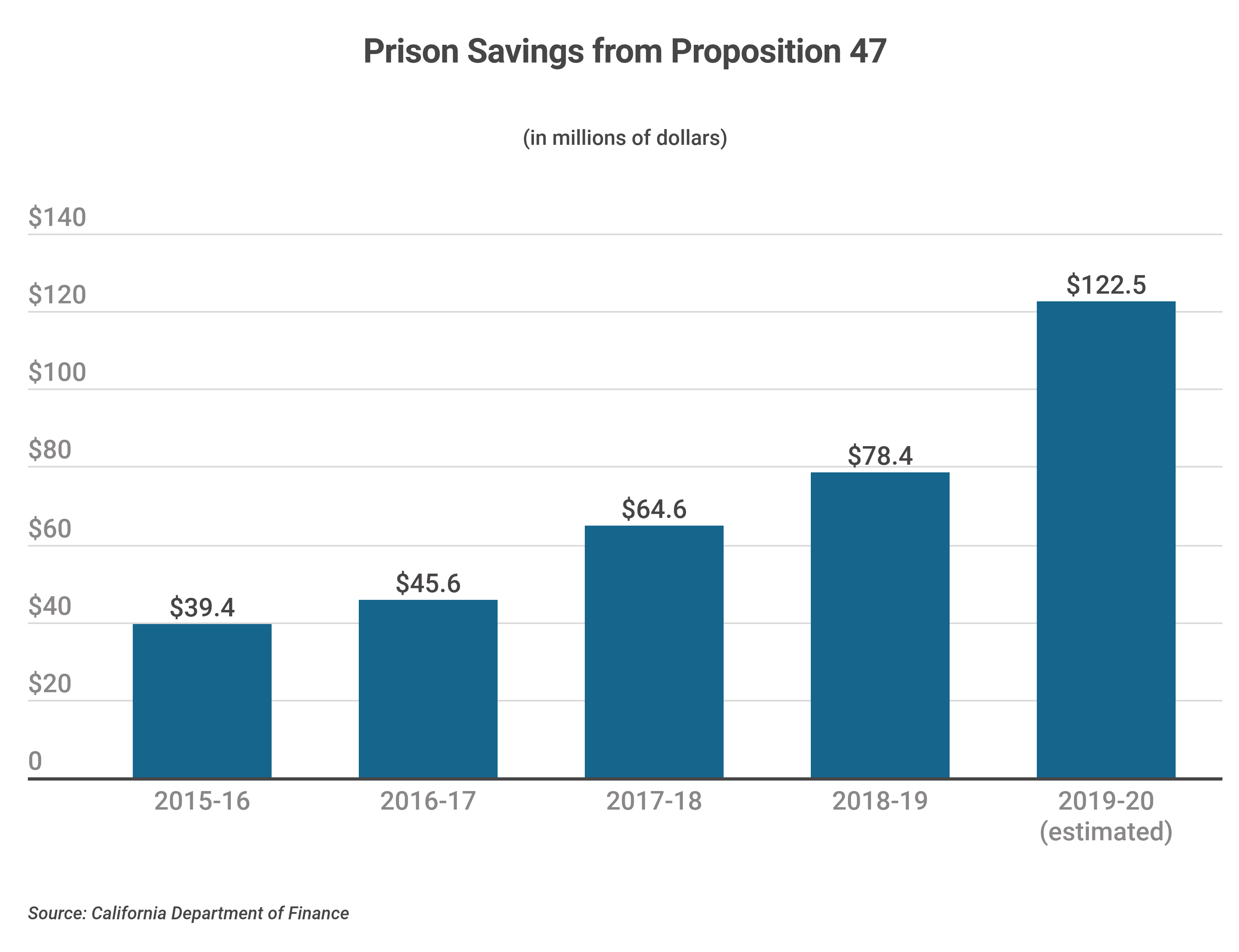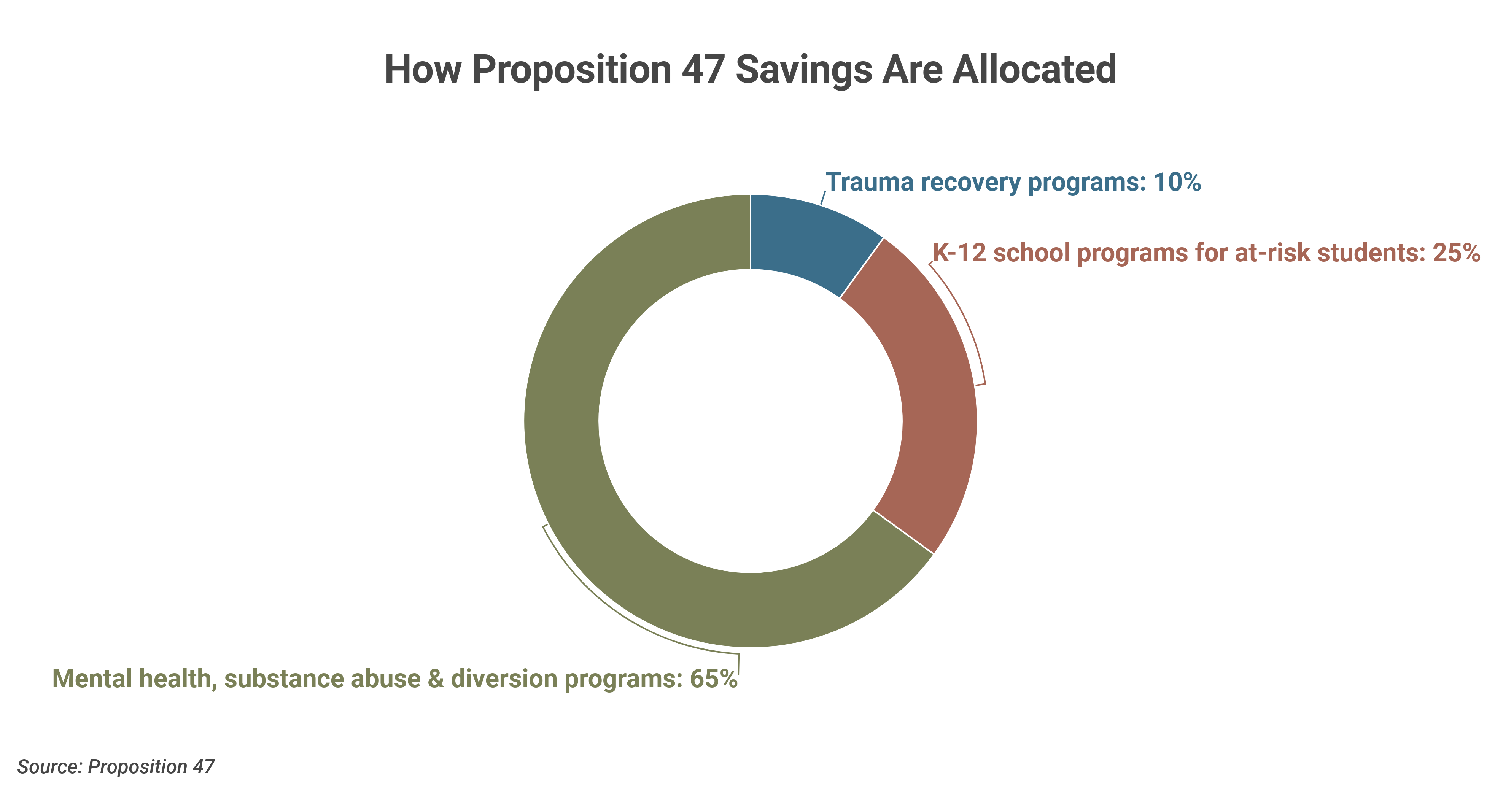Proposition 47 Criminal Justice Reform Projected to Save State Over $122 Million
Five years after California voters embraced a ballot measure aimed at sending fewer people to prison and investing more in victims services, schools and treatment programs, Proposition 47 is projected to save a record $122.5 million next fiscal year by keeping 4,569 inmates out of state prisons.
The decrease in inmates, and commensurate savings, has allowed California to end its contracts with private, out-of-state prisons, while reducing a prison population that was at crisis levels a decade ago, Gov. Gavin Newsom said recently.
The more than $122 million represents the biggest estimated Proposition 47 savings to date — a $44 million increase from the previous fiscal year — but it comes as the criminal justice reform faces its biggest challenge, in the form of an initiative slated for the November ballot that would roll back some of its provisions.
But Lenore Anderson, founder and president of Californians for Safety and Justice, which wrote Proposition 47, said she sees the budget news as an opportunity to educate voters about the benefits of keeping the reforms in place.
“We are very excited that the amount of money saved annually keeps increasing — that’s certainly the goal,” she said. “The idea was not just reduce incarceration at the state level, but to reduce the imbalanced way that state public safety dollars are invested in the state. We can’t continue to put all the money at the back end in these sort of bloated and costly prisons and expect an effective approach to public safety.”
Proposition 47, which was approved by 59% of voters in 2014, calls for many nonviolent crimes, such as drug possession and petty theft, to be charged as misdemeanors instead of felonies. That’s resulted in fewer people being sent to state prisons, providing the monetary savings reflected in Newsom’s budget.

Anderson said the result of that savings is two-fold: One, the money is reinvested in programs aimed at preventing future crimes from occurring. That includes trauma recovery services for victims and public school programs that support kids who are at risk of dropping out or are victims of crime themselves. It also includes grants for mental health, substance abuse and diversion programs for criminal offenders.
“The number one predictor of someone becoming a victim of crime in the future is if they have been a victim in the past,” Anderson said. “When we talk about giving victims a chance to recover from crime and get safe and get on a pathway to recovery, we are actually talking about preventing future victimization.”
The second impact: Californians are no longer being sent to costly private prisons in other states. Anderson said the benefits of that change are enormous as well, since inmates have a much better chance of succeeding once they exit prison if they’ve been able to stay connected with family and community.
The measure has also allowed some Californians to turn their lives around. The law allows people previously convicted of these nonviolent crimes to petition courts to have their sentences reduced to misdemeanors, a change that has allowed many people to leave prison or jail early, and to wipe clean past conviction records that can prevent ex-offenders from getting jobs or participating in society in other ways.

But law enforcement groups have long opposed the measure, saying it has resulted in an uptick of shoplifting and property crimes, such as car break-ins. They are running a ballot measure in November that would allow prosecutors to charge some theft and fraud crimes as felonies again.
It would also require people who benefited from Proposition 47 by being charged with misdemeanors instead of felonies to hand over their DNA to state and federal government databases.
State assemblyman Jim Cooper, D-Elk Grove, who was a 30-year law enforcement veteran before being elected to the Legislature, helped write the new ballot measure. He said while saving money and ending private prison contracts is a good thing, Proposition 47 has resulted in more shoplifting by theft rings, more crowded county jails and less success in drug courts.
But Cooper rejected the idea that his ballot measure would reverse the positive gains from Proposition 47, saying it could result in more people being sentenced to county jail but not state prison, and that any increase in corrections spending would be minor compared to the overall savings.RELATED COVERAGE‘Returning as Good Neighbors’: For Young Prisoners, Newsom Proposes Rehab ProgramCan SF’s Chesa Boudin Flip the Script for the Nation’s Progressive DAs?California Voters Support Ending Cash Bail, New Poll Shows
“The biggest thing is that [my ballot measure] does not send anybody back to prison,” Cooper said. “So the folks that are opposed to it, to be honest, are just liars — they are being dishonest and disingenuous when they talk about it.”
Sacramento County District Attorney Anne Marie Schubert, who is also backing the new initiative, added that Proposition 47 removed leverage from judges in drug courts, and that the November measure would help fix that.
“There is nothing about the 2020 ballot initiative that would increase the prison population,” she said. “Rather, it enables the justice system to impose meaningful sentences that will encourage those with drug addiction to seek rehabilitation and treatment. Prior to the passage of Prop. 47, our drug courts showed demonstrable success, but were gutted when Prop. 47 became law.”
The new initiative would also roll back portions of another ballot measure, Proposition 57, which voters passed overwhelmingly in 2016, and make it harder for some inmates to get parole from state prison. Proposition 57 will reduce the prison population by some 8,600 inmates next fiscal year, according to state estimates; the new ballot measure would likely reduce that number, though it isn’t clear by how much.
Newsom, who has embraced criminal justice reforms like Proposition 47, indicated last week that he will campaign against the 2020 ballot measure; and former Gov. Jerry Brown, who wrote Proposition 57, has indicated he may use his remaining campaign funds to oppose it.
But Cooper said he hopes to convince voters that his ballot measure makes sense. He noted that California has embraced a number of wide-ranging criminal justice reforms over the past decade — many led by Brown — but that some need tweaks to succeed.
“We’ve done a lot reforms, there have been some good reforms, but there’s been no look-back on the reforms, and people here in the [Capitol] building will tell you quite candidly that there’s been some mistakes made in those reforms,” he said. “But no one is willing to go back and change those mistakes.”
Marisa Lagos
KQED News